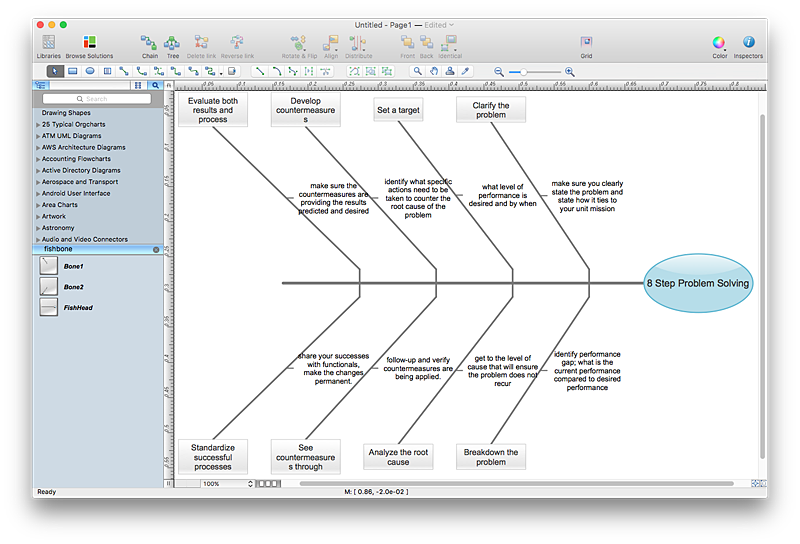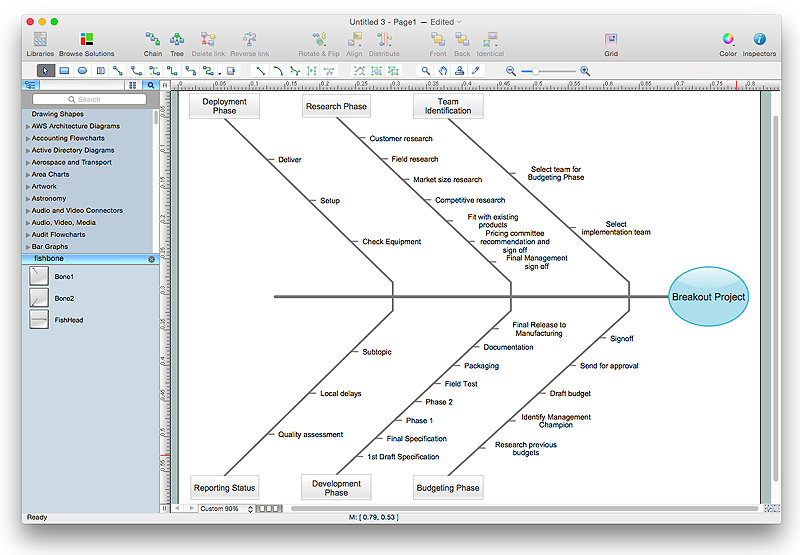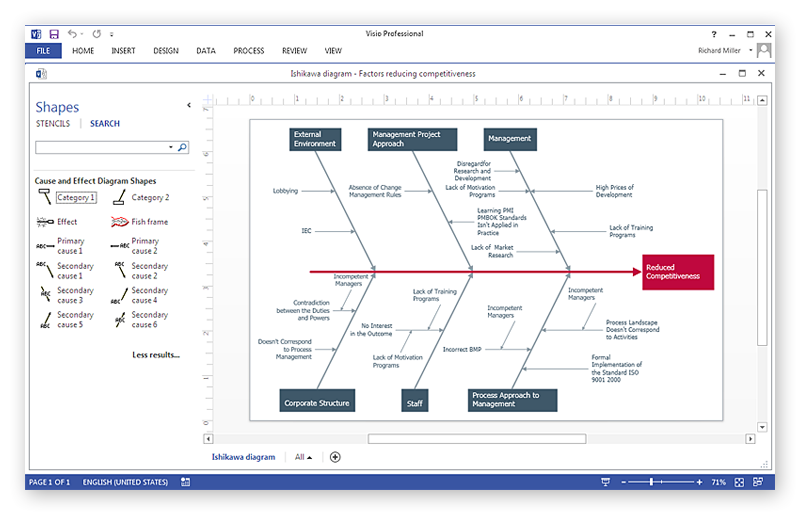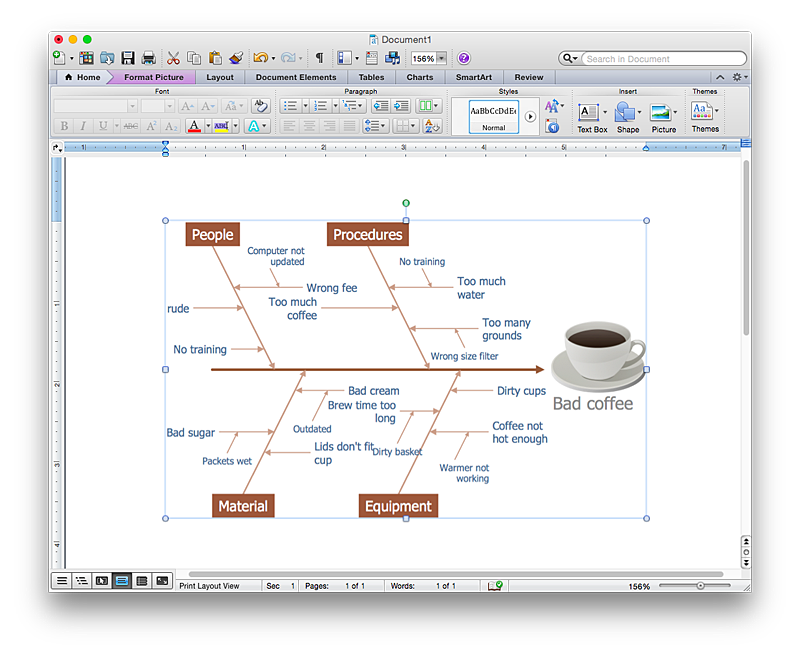HelpDesk
How to Create a Fishbone (Ishikawa) Diagram Quickly
A Fishbone (Ishikawa) diagram is also called cause-and-effect diagram. Fishbone diagram is often used in business to determine the cause of some problem. The diagram illustrates the main causes and sub-causes leading to an event. The main goal of the Fishbone diagram is to illustrate in a graphical way the relationship between a given outcome and all the factors that influence this outcome. The complete diagram resembles a fish skeleton as its name implies. The ability to create a Fishbone Diagram is supported by the Fishbone Diagram solution. Use ConceptDraw MINDMAP for structuring data and then ConceptDraw PRO for generating a Fishbone Diagram from mind map structure.
 Fishbone Diagram
Fishbone Diagram
Fishbone Diagrams solution extends ConceptDraw PRO software with templates, samples and library of vector stencils for drawing the Ishikawa diagrams for cause and effect analysis.
 Management
Management
This solution extends ConceptDraw PRO v9 and ConceptDraw MINDMAP v7 with Management Diagrams and Mind Maps (decision making, scheduling, thinking ideas, problem solving, business planning, company organizing, SWOT analysis, preparing and holding meetings
HelpDesk
How to Draw a Fishbone Diagram with ConceptDraw PRO
Fishbone (Ishikawa) Diagram is often used in business to determine the cause of some problem. A Fishbone diagram is also called cause-and-effect diagram.The main goal of the Fishbone diagram is to illustrate in a graphical way the relationship between a given outcome and all the factors that influence this outcome. The complete diagram resembles a fish skeleton as its name implies. Cause and Effect analysis is used in management to identify the possible causes of a problem in order to eliminate them. The ability to create a Fishbone Diagram is supported by the Fishbone Diagram solution.HelpDesk
How To Create a MS Visio Cause and Effect Diagram Using ConceptDraw PRO
Cause-and-Effect Ishikawa Diagram is a graphical method of analysis and cause-effect relationships, a tool in the form of fish bone. It is used to systematically determine the cause of the problem and represent it graphically. The technique is primarily used in the framework of quality management for the analysis of quality problems and their causes. Nowadays, it has found worldwide distribution and is used in multiple problem areas. It is one of the tools of lean manufacturing, which is used in group work to find the problems and their causes. ConceptDraw PRO allows you to easily create Fishbone (Ishikawa) diagram and then make a MS Visio VSDX, or VSD files from your diagrams in a couple clicks, using the export capabilities of ConcewptDraw PRO.
 Fishbone Diagrams
Fishbone Diagrams
The Fishbone Diagrams solution extends ConceptDraw PRO v10 software with the ability to easily draw the Fishbone Diagrams (Ishikawa Diagrams) to clearly see the cause and effect analysis and also problem solving. The vector graphic diagrams produced using this solution can be used in whitepapers, presentations, datasheets, posters, and published technical material.
HelpDesk
How to Add a Fishbone (Ishikawa) Diagram to a MS Word Document Using ConceptDraw PRO
The ability to create a fishbone (Ishikawa) Diagram is supported by the ConceptDraw Fishbone Diagram solution. ConceptDraw PRO allows you to easily create a fishbone diagrams and then insert them into a MS Word document.- Examples Of Fishbone Map
- Using Fishbone Diagrams for Problem Solving | Concept map - Risk ...
- Management | PM Response | Business Productivity Diagramming ...
- Fish Bone Mind Map
- Fishbone Diagram | PM Easy | Metro Map | How To Construct A ...
- Mind Map Making Software | Cause and Effect Analysis ( Fishbone ...
- Fishbone Diagram | Management | Quality Mind Map | Fishbone ...
- Fishbone Diagram | SWOT Analysis | Quality Mind Map | Down Load ...
- Management | Fishbone Diagram | Business Productivity ...
- Service 8 Ps fishbone diagram - Template | Fishbone Diagram ...
- Positioning map | Service 8 Ps fishbone diagram - Template ...
- Value Stream Mapping | Quality | Fishbone Diagram | Vsm Fish ...
- Entity-Relationship Diagram (ERD) | Metro Map | Fishbone Diagram ...
- Value Stream Mapping | Fishbone Diagram | Metro Map | Image ...
- Business Productivity Diagramming | Metro Map | SWOT Template ...
- Education | Fishbone Diagram | Education Mind Maps | Education ...
- Continent Maps | Maps | Spatial Infographics | Fish Bone Diagram Of ...
- Fishbone Diagrams | How to Draw a Fishbone Diagram with ...
- Cross-Functional Flowcharts | Design elements - Fishbone diagram ...
- Fishbone Problem Solving | Venn Diagram Examples for Problem ...



